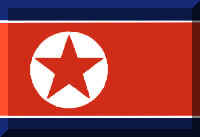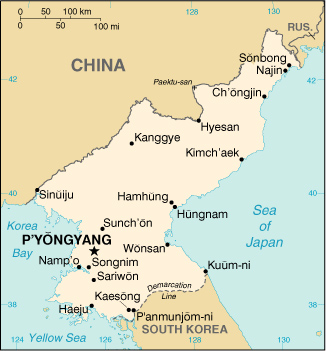
North Korea: A Rare Glimpse
By Raymond Saint-Pierre
The regime of the late Great Leader, Kim Il Sung, and of his son, the Dear Leader, still lives in splendid isolation. The masses can listen to only one radio station, watch only one television channel and read only one newspaper: the regime's.* When foreigners visit North Korea, all cell phones are confiscated and held by the government; apparently, they are released back to the owner upon leaving the country. - (* Editor's Note: According to the C.I.A. World Factbook, North Korea has 16 A.M. radio stations and 14 F.M. radio stations since 1999. We do not know why the discrepancy, but we will contact Mr. St. Pierre and find out.)
I was surprised when I was granted a visa to accompany a Canadian delegation on its way to the capital, Pyongyang, to establish diplomatic relations with the Democratic People's Republic of Korea.
Everywhere, we could see people suffering from the shortage of food – in the fields, in orphanages, in the streets – emaciated babies and children, workers weakened by a very poor diet. The problem was that every time we tried to take pictures of these tragedies, a hand would cover our camera lens. "No pictures," we were told.
North Korea was eager to welcome foreign delegations because they need
outside help – we were accompanying a Canadian Non-Governmental Organization – but, at the same time, the hermit country couldn't bear the humiliation of having pictures of the human despair broadcast around the world, pictures that would draw attention to the regime's failures. This was the same regime that was preaching self-sufficiency to its people, that wanted to remain independent from the rest of the world.
So relations with our "supervisors" had been very difficult. We had managed to mellow them a little, with beer and pool games at the hotel, but they remained bitter. They couldn't understand why we wanted to film all of these negative images.
At the time, it was practically impossible to go out of the hotel, even for a short walk. When I tried to do a stand-up in front of the hotel, security guards, some policemen and our minders descended upon us. We had to negotiate for quite a time, and finally we were allowed to stand in front of the hotel – as long as we didn't videotape any people.
When we left the country, our "shadows" told us they had never met any
western journalists before. They said they felt as if they had worked with people from another planet. I told them I also felt as if I'd spent a few days on another planet!
That's why I was surprised to learn I would be allowed to visit Pyongyang a second time. It's already quite difficult for western journalists to get to North Korea once; it's even more difficult to get a return visit.
Today, this regime is still isolated from the rest of the world, the population is still bombarded by the same messages of adoration of the Great Leader and of his son, the Dear Leader. Thousands of people still visit Kim Il Sung's mausoleum every day. They can still see his body, preserved forever. Masses still bring flowers to his huge statue, which dominates the centre of Pyongyang.
We could do our stand-ups without alarming the police. Our "shadows" and the hotel security were just a tad nervous, but they let us do our work. It's now possible for foreigners to take a walk downtown (without the TV camera). People in the streets are now used to seeing foreigners.
Until now, the population had been taught to stay away from foreigners. The last time, many North Koreans would simply turn their backs to us because they thought we were dangerous. This time, it was possible to get near people and videotape them. We even managed to interview some North Koreans!
It goes without saying that the fact that we were in Pyongyang to cover
the establishment of diplomatic relations with Canada contributed to the fact that average north Koreans and our "shadows" were more forthcoming. But I also had the impression that the population now understands that it's these same dangerous foreigners who have been bringing essential food aid to North Korea. I also dream that people now understand that the foreign media can help their country, by showing its problems, by drawing attention to its tragedy.
But don't get me wrong. It's still difficult to do television reports in North Korea. It's still forbidden to show anything military, even though thousands of soldiers swarm the city!
We were often stopped from videotaping some streets, without explanation. Diplomats tell us it may be because many buildings are not what they appear to be, and might hide a strategic installation. Some places we visited had an "unreal" feel to them. In a showcase hospital, for instance, we could see workers studying non-existent samples through the microscope and feeding data to printers without paper. There's always that tendency to hide problems, while at the same time, trying to draw foreign aid.
I don't know if I'll ever return to North Korea, but there would undoubtedly be many good reasons to do so if North Korean authorities finally decide to show to the foreign press the enormous tragedy the country is still facing. Solutions can't and won't be found in a few months; it's more a matter of years. The country is in ruins and its people are hungry.
(Webmaster's note: We thank CBC NEWSWORLD for this interesting article by journalist Raymond Saint-Pierre This article is quoted verbatim, as it appeared on the CBC Newsworld Site in March of 2001).
CBC News, Beijing

"North Korea is THE place to go....if you want to buy ballistic missile technology."
- Condoleeza Rice (National Security Advisor - Bush Administration)(quoted Feb. 3rd, 2002 directly from "C.N.N." Cable News Network.)
PYONGYANG, NORTH KOREA - North Korea remains one of the most bizarre places to visit on this planet. It also remains one of the most difficult places on Earth for foreign journalists to get into and to report on.
The first time I travelled to North Korea, in July 1997, relations with our unavoidable government "minders" – those are the people assigned to follow us everywhere – had been very tense. The country was in the midst of a terrible drought after three years of bad crops and bad weather.
"There's always that tendency to hide problems, while at the same time, trying to attract foreign aid."
- Raymond Saint Pierre, Broadcast Journalist, C.B.C. News
People are still hungry, and the country must still rely on foreign aid to feed at least part of the population, but this time, relations with our "minders" were much more relaxed. One still has to follow a strict program of activities, prepared by North Korean authorities. We still felt "listened to" and followed. But the tone had changed.
click here!
click here!